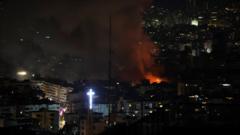The United States exercised its veto power to block a U.N. Security Council resolution calling for an immediate cease-fire in Gaza, following a request from ten nonpermanent members and amidst significant global support for humanitarian aid in the region.
# U.S. Vetoes U.N. Resolution for Gaza Cease-Fire Amid Global Push for Peace

# U.S. Vetoes U.N. Resolution for Gaza Cease-Fire Amid Global Push for Peace
U.S. blocks unanimous Security Council resolution aimed at cease-fire and humanitarian aid in Gaza, igniting international debate.
In a contentious move, the U.S. vetoed a resolution from the U.N. Security Council on Wednesday, aimed at enforcing an immediate cease-fire in Gaza and calling for the unconditional release of hostages alongside the resumption of humanitarian aid deliveries to the affected region. This decision marked the first substantial attempt to address the Israel-Hamas conflict since the escalation began after the October 7, 2023, attack by Hamas on Israel.
The resolution had garnered backing from all other members of the Council, including major powers like Russia, with ten of the nonpermanent members emphasizing their shared consensus that the ongoing war must cease. They articulated concerns over the plight of Gazan civilians who are suffering due to the protracted conflict.
The U.S. was the sole nation opposing this resolution, highlighting a narrative of isolation in its diplomatic stance that strongly supports Israel's right to defend itself. Dorothy Camille Shea, the interim U.S. representative at the U.N., remarked that the hostilities would end only if Hamas surrendered, placing the blame for humanitarian crises on the militant group.
This action adds to a pattern since the war began, as the U.S. has vetoed four similar resolutions, showcasing an unwavering commitment to its ally, Israel, despite growing international criticism regarding the humanitarian impact in Gaza. The divided response reflects deeper geopolitical tensions and the contrasting narratives surrounding the conflict, raising questions about the future of diplomatic efforts to achieve peace in the region.
The resolution had garnered backing from all other members of the Council, including major powers like Russia, with ten of the nonpermanent members emphasizing their shared consensus that the ongoing war must cease. They articulated concerns over the plight of Gazan civilians who are suffering due to the protracted conflict.
The U.S. was the sole nation opposing this resolution, highlighting a narrative of isolation in its diplomatic stance that strongly supports Israel's right to defend itself. Dorothy Camille Shea, the interim U.S. representative at the U.N., remarked that the hostilities would end only if Hamas surrendered, placing the blame for humanitarian crises on the militant group.
This action adds to a pattern since the war began, as the U.S. has vetoed four similar resolutions, showcasing an unwavering commitment to its ally, Israel, despite growing international criticism regarding the humanitarian impact in Gaza. The divided response reflects deeper geopolitical tensions and the contrasting narratives surrounding the conflict, raising questions about the future of diplomatic efforts to achieve peace in the region.






















